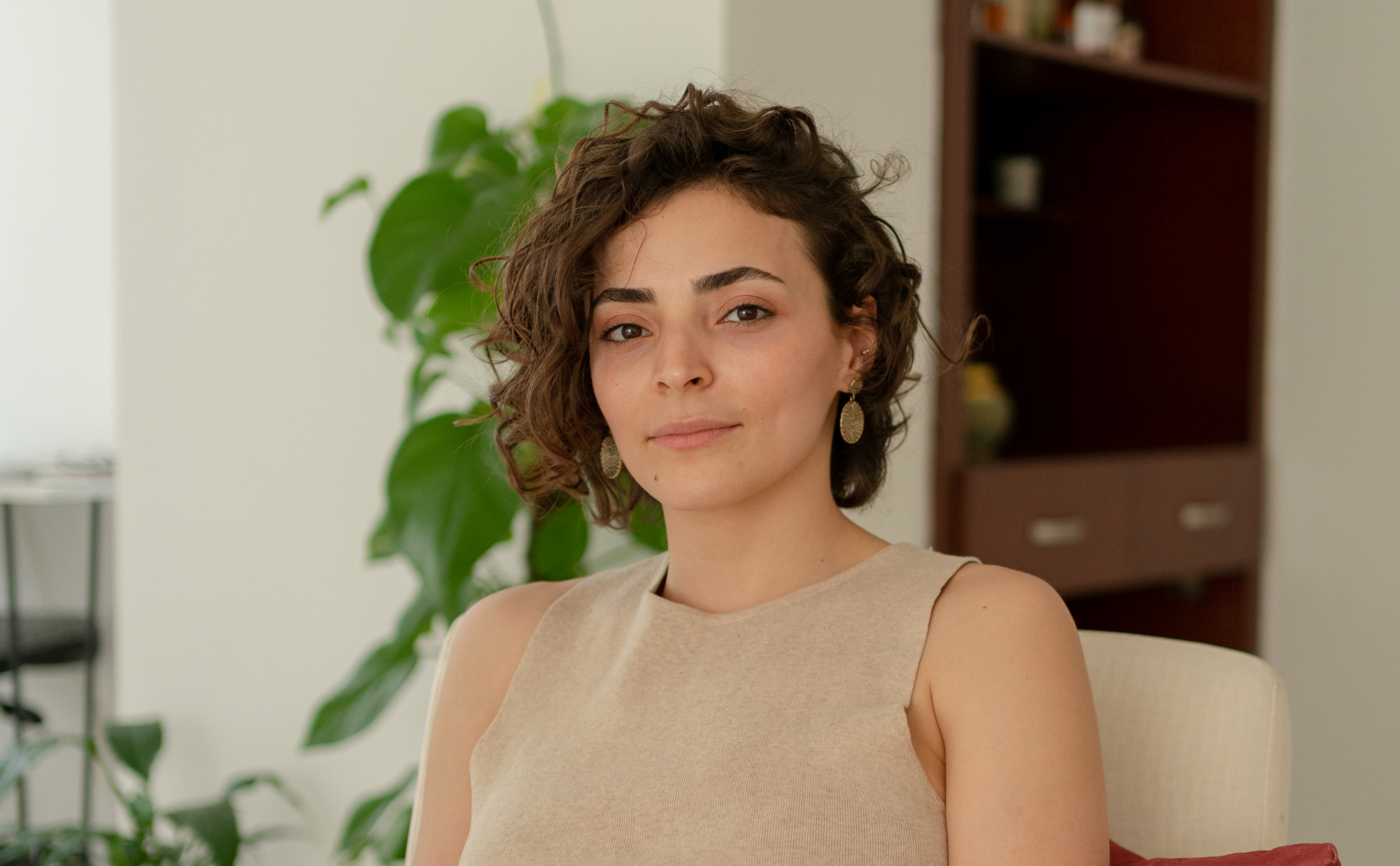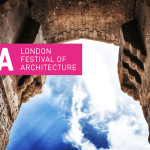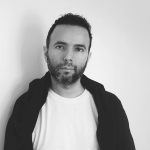How was life for you as a young Syrian girl? How did the circumstances affect your growing up and the path you are taking today?
I was born in Masyaf, a town near Hama, which played an important role in shaping my personality. I was raised on the values of appreciating knowledge, culture and openness, in addition to accepting and respecting others and focusing on the learning aspect of interpersonal relations. What brings me to my memory about Masyaf are cultural gatherings, poetry, music, reading and exchanging opinions. I learned in Masyaf that everyone has an opinion.

The cultural heritage of Masyaf is very rich. In my childhood, I read some of the letters of the “Ekhwan al- Safa WA Khallan al-Wafa” , which is a group of Sufi thinkers who have many books that detail many life sciences from a Sufi’s point of view. These letters are an important part of the cultural heritage of the region, especially since some of these group members are buried in Masyaf.
One of the things that definitely affected my personality and point of view on life was my departure from Syria during the conflict. I left Syria for Turkey when I was 18 years old. That was the beginning of my university studies. I had a great desire to know the sciences of technology. What is happening in Syria gave me a high sense of responsibility towards my community, a belief in the individual’s ability to contribute to change, in addition to a passion to assist. Because of this transformation, I developed a great passion for political science. I have already studied gender recently and will soon start studying communication and political science at university.

You are the executive director of DARB in Gaziantep, Turkey. Moreover, you have many activities with Syrian and international platforms. How would you describe the work and events you are participating in today?
DARB is a dynamic platform led by young people. We work on peace-building, negotiation and conflict resolution with Syrians to improve the contexts in which they live. Examples include working on building the concept of active citizenship to enhance a sense of responsibility towards the societies in which we live.
In addition to my position as co-executive director with one of my colleagues, I also work as a communication and advocacy coordinator. My work with DARB has enabled me to learn and develop many skills. The most important skills and experiences that I acquired in DARB are horizontal participatory management, communication, openness to learning and benefiting from the experiences of others.
Through my work with DARB, I developed a sense of responsibility towards the team on all sides, such as obtaining funds and sustainability and ensuring the safety and security of the team.
In addition to my work with DARB, I am also active in the Syrian women’s political movement and many networks and programmes for women.
You took part through DARB in the work, which is called “citizenship charter,” which according to the charter is a statement of the hopes and aspirations of Syrian citizens. Can you share with us your experience with the charter? What do you think are the challenges that you faced in achieving this work?
The charter is a big work that took about four years to complete by several organizations, including DARB. The charter is the result of long dialogues and discussions that took place through the establishment of international cafes in several places in Syria, Turkey and Europe. These discussions resulted in a live document that reflects the views of the Syrians who participated in it, and we do not pretend that it reflects the vision of all Syrians.
What distinguishes the charter is that it is a live document, it is open and editable. We invite all Syrians to benefit from and enrich it.
One of the most important challenges we faced was finding common ground between the Syrians, which would enable us to know where to start the discussion. Charter work was an interesting learning journey about what we want as Syrians.
The paper of the Syrian youth as leaders of the peacebuilding process is a paper that reflects the aspirations of a number of young Syrian men and women and activists working on peacebuilding. What is your role in this job? It was mentioned in the paper that we should focus on the peace approach, starting from the base and reaching the top. How do you see that being possible internationally today?
We started working on that paper in DARB based on the idea that it is a youth organization led by young people. We have cooperation with other youth organizations and individuals from the young generation. We see every day the great efforts made by Syrian youth in different sectors. Nevertheless, the question is where is the voice of the Syrian youth when talking about Syria and its future? Syrian youths see that they are not represented and have no voice or opinion on the future of Syria. I see the paper as an expression of the youth’s voice and documentation of their efforts regarding the peace-building process for the future of Syria.

Photo © Carola Capellari
Regarding the approach to peace. Well, that starts from the base up to the top. We have encountered many difficulties to clarify our point of view by working on peace-building. I think it depends on understanding the word “peace”. Peace is not limited to the concept of stopping military operations. Unfortunately, the decision to stop military operations may be a political decision that the Syrians cannot make now.
I see peace as including other meanings that can be worked on by young people, and that process can start now. We are thinking of building a sustainable peace. If military operations stop one day, we will need awareness of the concept of peace.
We will need to be aware of all that the word peace implies, such as non-violence, justice, and the strengthening of our collective identity as Syrians. We need to learn about dealing with potential conflicts, not just military ones. It should be noted that many Syrian youths are currently involved in military operations. Through our work, we aspire to think of future solutions to transform youth energy into peacebuilding efforts.
Did you encounter difficulties (as a young girl) during your work and your peace-building activities in a society dominated by males?
I started experiencing this kind of challenge after leaving Masyaf, especially after I stayed in Turkey. Sometimes I feel that I need to prove myself or prove that I am worthy of this or that role at work. I remember being explicitly judged that I may be unable to work on advocacy campaigns and influence decision-making as a girl. Some people think that men are better to do such work and that it may suit me to work on other administrative tasks.
This challenge is clearly visible when communicating and working with partners and collaborators outside of my workplace. I see it as a global problem and the struggle against it is long and will continue taking into consideration the differences in what has been achieved today between different parts of the world.

photo©Carola Cappellari
Speaking of gender and gaps in societies, how can we find common ground for Syrian society, for all genders and ages as well, to give them equal opportunities to have their voices heard?
I see that the responsibility to strive for achieving this lies with civil society institutions and individuals. Civil society needs to create safe spaces that accommodate everyone and ensure the protection of freedom of expression. Before that, work must be done to raise awareness of the importance of diversity and to appreciate and respect each other. I would like to highlight here the importance of intergenerational dialogue. We must listen to each other. We must recognize, value and respect our identities. Then we can start building our collective identity. None of this will happen without appreciating differences and promoting a culture of dialogue.
As a young peacebuilding activist, how would you describe the discussion among the Syrian youth generation on the issue of living in the diaspora and to what extent they see the value of connecting with the cultural heritage after living in the diaspora including Palestinian-Syrian, Syrian-Kurdish and Armenian-Syrian, from among other heritage groups.
I think this issue can be viewed from two sides. On the one hand, I see that the Syrian youths in the diaspora have gained a greater area of freedom to communicate their cultural heritage and express it by all Syrian groups. Some minorities in Syria experienced some restrictions on their expression of their cultural heritage in the past and that no longer exists in the diaspora.
Today, we see many examples in the diaspora of communicating with the cultural heritage through art, music and other things. On the other hand, some Syrians see that belonging to Syria has become a burden that weighs on their backs, and this is very understandable. Some of them even choose to walk away from their cultural heritage. That is also understandable to me. As a result, it may create a kind of separation between the individual and his cultural heritage. I believe that cultural heritage and common culture are an effective tool for creating common spaces between Syrians. Music, art, painting and even food are able to touch our feelings as Syrians, and they can contribute to bringing us together in one place and contribute to building peace.
What are the things that influence and inspire you in your career?
I believe in the need to provide hope and spaces of love and concern around us. We have to be in touch with those kinds of spaces. I think our work is rather hard and it can make us angry or frustrated sometimes. We need to learn how to have fun at work. One of the spaces that helped me a lot in this context is a non-traditional educational institution in Cairo called “CILAS“. It was a turning point for me getting to know their work, and I learned a lot from them. Returning to hope, the belief that there should be hope for change gives meaning to all work and effort that I do every day.
What is next? What dream are you excited about?
I look at this question today in a completely different way than I did several years ago. I was thinking that the answer should be a list of achievements. Today, I see life as a continuous learning journey. I am excited and passionate about many things in the near and far future. For example, I am very passionate about politics, peace-building and feminism, as well as working on sustainability and climate change mitigation. I am currently working on a podcast that aims to create a space for me as a young Syrian woman and a feminist activist that makes me grateful to everyone who contributes to giving me this opportunity to test the experience and impact of the podcast. In addition to planning a project with a sustainable dimension related to respecting our planet, its sources and the climate changes that are taking place in the world. All this and many ideas I am so excited to test out.
🌿
Abdullah Alsmaeel




